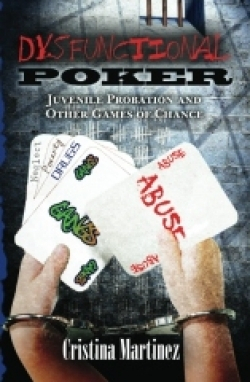Dysfunctional Poker
Juvenile Probation and Other Games of Change
If there ever was a book that should be judged by its cover, this is it. The front cover of Cristina Martinez’ heart-wrenching, stunning debut, Dysfunctional Poker: Juvenile Probation and Other Games of Chance, compels the reader to crack this volume to discover how probation can be likened to a card game.
In the foreword, Martinez explains how situations differ depending on a myriad of factors—the nature of the crime, previous criminal history or victimization, family background—as well as the attitude of judges, lawyers, and parole officers. The author gives a hypothetical example of how five juvenile offenders caught committing the same crime could receive five different sentences. From the outset, Martinez draws the audience into the dizzyingly complicated world of juvenile probation by keeping her language clear and explaining any professional jargon.
Not content to settle in a world of hypothetical kids committing imaginary crimes, Martinez deftly fictionalizes stories from her thirty or so years as a juvenile probation officer. She worked as one of the only Spanish-speaking officers in an Arizona probation department where many of the offenders were poor Latinos whose families often knew little English. Martinez paints herself as a co-mother to her young charges. Her wisdom and creative problem-solving abilities enable her to see what lies behind the crime as she bonds with the family to work out the underlying issues.
Martinez never comes across as an unrealistically saintly figure. She continually reminds readers that her expertise comes from years of training. She portrays the juveniles in an equally nuanced manner, examining their personalities and the circumstances which may have led them to commit these crimes. Time and time again, she is able to ferret out the talents or strengths in a teen who initially appears sullen or brash. Readers get to know the offenders as people and begin to root for them to succeed.
Although many chapters end on a positive note—no doubt designed to uplift the audience after hearing about the youths’ misfortunes—the epilogue assures readers, with sobering realism, that not every story ends happily ever after. In between her moving characterizations of young people, Martinez shows how illegal immigration, poverty, excess paperwork, and limited English-language proficiency make the probation bureaucracy tough on employees, the youths, and their families. When discussing each of the aforementioned factors, Martinez refreshingly refuses to assign blame to anyone, preferring instead to narrate how she sees things.
Dysfunctional Poker poignantly reminds its audience that one person can indeed change the world. Readers will come away from this emotional roller coaster of a book informed, amazed, and ultimately inspired by how the author handles the cards she and those in her care have been dealt.
Reviewed by
Jill Allen
Disclosure: This article is not an endorsement, but a review. The publisher of this book provided free copies of the book and paid a small fee to have their book reviewed by a professional reviewer. Foreword Reviews and Clarion Reviews make no guarantee that the publisher will receive a positive review. Foreword Magazine, Inc. is disclosing this in accordance with the Federal Trade Commission’s 16 CFR, Part 255.

